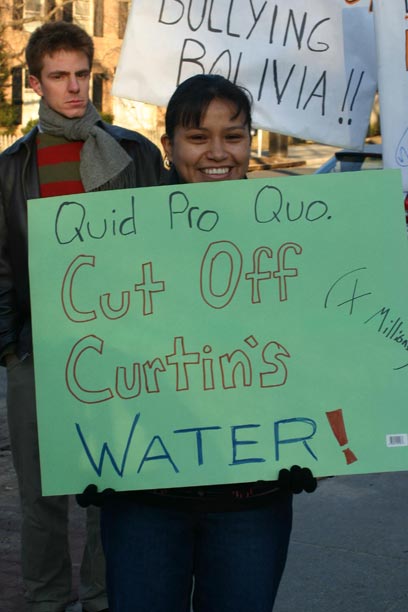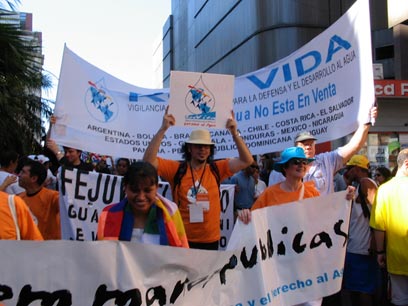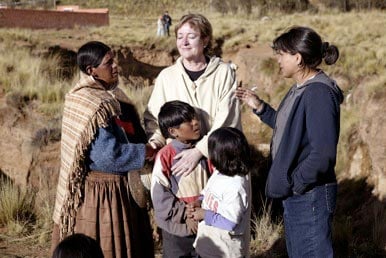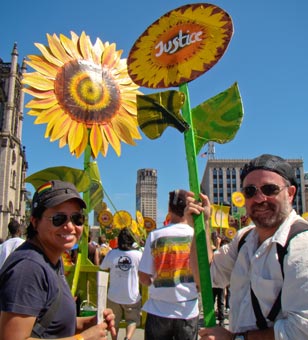Part of the Series
Birthing Justice: Women Creating Economic and Social Alternatives
Did you know that Truthout is a nonprofit and independently funded by readers like you? If you value what we do, please support our work with a donation.
In case after case around the world, water is being turned into a good for sale and for profit. Driven by a different vision and by economic necessity, a global counter-trend is growing to assure that household water be free or cheap, accessible, and safe, and that the earth’s water be kept pure and flowing. Marcela Olivera is a part of this movement. In 2000, she played a key role in organizing the massive protests in Cochabamba when residents of the city forced the Bechtel Corporation to give up control of the municipal water system, thereby restoring water as a human right for all instead of as a source of corporate income. This victory has been repeated elsewhere in Bolivia and around the world.

Marcela Olivera | Cochabamba, Bolivia
There have been a series of policies implemented in Bolivia intended to privatize our natural resources. One of these directly impacts people’s everyday lives: it’s the move to privatize water by giving contracts to multinational corporations  (Photo: Marcela Olivera)to manage the municipal water supply and other sources of water. In Bolivia, there was a huge public outcry against this in 2000 and 2005 and, in the end, we were able to reverse the policy.
(Photo: Marcela Olivera)to manage the municipal water supply and other sources of water. In Bolivia, there was a huge public outcry against this in 2000 and 2005 and, in the end, we were able to reverse the policy.
Now that’s the official, romanticized version of what happened, but nobody sees what’s happened since then. The struggle over who controls water is ongoing.
No one seems to pick up on how closely water issues are related to other urgent things that are now happening in Bolivia. Water is the one issue where everything intersects; it crosses over into political issues and economic issues in every country. In the struggle over water, people have also been fighting to have their voices heard and to better their living conditions. I think it’s really important that we understand that. Even the fact that Evo Morales is president now is really a result of the water war that broke out in 2000.
What we’re fighting for is effective, participatory control by the people over our social resources of water, health and education, as an  (Photo: Marcela Olivera)alternative to private control. This is going on all over Latin America.
(Photo: Marcela Olivera)alternative to private control. This is going on all over Latin America.
We’re not searching for one solution, a single model of how to do things. I don’t believe there is a single solution to our problems. Our realities are all so diverse that it would be impossible to say, “This will work for everybody.” There are a lot of possible solutions out there. What’s going to be really important now, in the midst of our fights to control our own resources, is to connect with people on a human level. I think that’s where we have to start, with the human side of things and then, from there, to move on to bigger things, bridging the distances between us – not just the physical ones, but gaps in technology, communication, and sometimes even language.
One thing that we’re taking away from globalization is that it’s not just about the economic policies that are being imposed on us. It’s also about bringing us into contact with one another.  (Photo: Noah Friedman)We’re building alliances among ourselves that respect those differences and the diversity of experiences. That’s the great thing about it. One of the connections that’s happening is between women. The group I work with, Red VIDA [Inter-American Network of Vigilance for the Defense and Right to Water], is run by women. In fact, it’s a Latin America-wide water rights network of unions, non-governmental organizations, and grassroots groups, but women are the driving force. If you look at the outreach committee, it’s all women; we’re from El Salvador, Uruguay, Mexico, Bolivia, Brazil, and the US. The name says it all: the word ‘network’ is feminine in Spanish.
(Photo: Noah Friedman)We’re building alliances among ourselves that respect those differences and the diversity of experiences. That’s the great thing about it. One of the connections that’s happening is between women. The group I work with, Red VIDA [Inter-American Network of Vigilance for the Defense and Right to Water], is run by women. In fact, it’s a Latin America-wide water rights network of unions, non-governmental organizations, and grassroots groups, but women are the driving force. If you look at the outreach committee, it’s all women; we’re from El Salvador, Uruguay, Mexico, Bolivia, Brazil, and the US. The name says it all: the word ‘network’ is feminine in Spanish.
I believe women are organizers by nature, because we’re very sensitive and because we have the ability to show what we’re feeling. But women are still marginalized; there’s a kind of invisibility around the work that women do on water issues. For example, I notice that the organizing work is mainly done by women, but then the one who always stands up in front of the meeting to explain how everything was organized is a man.
I think it’s fantastic that women have stepped up and are leading the way in the fight over water rights. In our continent, at least, the face of the movement is the face of a woman.
To learn more about Marcela Olivera’s water rights network, Red VIDA, please see www.laredvida.org (Spanish language only).
Interview translated by Ocetelo Baena.
Inspired? Here are a few suggestions for getting involved!
- Corporate Accountability International has a webpage overflowing with ways to challenge corporate control of water by supporting local water rights and fighting the privatization of our water sources (www. stopcorporateabuse.org/water-campaign).
- Fight for clean public water so that residents can drink the free water that should be their right instead of having to buy it. Online, check out Water Justice (www.waterjustice.org) and The Rights to Water and Sanitation’s “Ways to Influence” webpage (www.righttowater.info/ways-to-influence). The Food and Water Watch “Take Back the Tap” curriculum teaches young people about the need for clean and affordable water and shows them how to advocate for it (www.foodandwaterwatch.org/water/take-back-the-tap/curriculum).
- Help preserve public infrastructure and services in your community. Stop attempts to privatize them by raising your voice in opposition to cutbacks to public services like art and physical education school programs, public transit, community gardens, and libraries.
- Use what can be shared in common instead of bought, like books at the library. Some libraries have great video and music selections, too.
- Consider Creative Commons licenses rather than copyrights for your writing, photography, and other creative ventures. A Creative Commons license facilitates sharing information and material using the “some rights reserved” instead of the “all rights reserved” approach. Learn how to license your work online (www.creativecommons.org).
- Use Open Source software and support the developers who share their work with the world. Source Forge’s website shows you how (www.sourceforge.net).
And check out the following resources and organizations:
- Blue Planet Project, www.blueplanetproject.net
- Our Water Commons, www.ourwatercommons.org
- Water Justice, www.waterjustice.org
- Red VIDA (in Spanish), www.laredvida.org
- Food and Water Watch, Other Worlds, Reclaiming Public Water, Red VIDA, and Transnational Institute, Changing the Flow, Water Movements in Latin America (2009), available online at: www.otherworldsarepossible.org/other-worlds/changing-flow
- Brid Brennan et al., Reclaiming Public Water: Achievements, Struggles, and Visions from around the World (Transnational Institute, 2006), available online at: www.tni.org/detail_page.phtml?page=books_publicwater
- Maggie Black and Ben Fawcett, The Last Taboo: Opening the Door on the Global Sanitation Crisis (Earthscan, 2008)
- Maude Barlow, Blue Covenant: the Global Water Crisis and the Coming Battle for the Right to Water (The New Press, 2007)
- “Blue Gold: World Water Wars,” directed by Sam Bozzo, Purple Turtle Films, 2008, available online at: www.bluegold-worldwaterwars.com
- “FLOW,” directed by Irena Salina, Oscilloscope Laboratories, 2008, available online at: www.flowthefilm.com
- “Thirst,” directed by Deborah Kaufman and Alan Snitow, PBS/POV, 2004, available online at: www.thirstthemovie.org
- On the Commons, www.onthecommons.org
- Jay Walljasper, All That We Share: A Field Guide to the Commons (The New Press, 2011)
Matching Opportunity Extended: Please support Truthout today!
Our end-of-year fundraiser is over, but our donation matching opportunity has been extended! All donations to Truthout will be matched dollar for dollar for a limited time.
Your one-time gift today will be matched immediately. Your monthly donation will be matched for the whole first year, doubling your impact.
This matching gift comes at a critical time. As Trump attempts to silence dissenting voices and oppositional nonprofits, reader support is our best defense against the right-wing agenda.
Help Truthout confront Trump’s fascism in 2026, and have your donation matched now!
